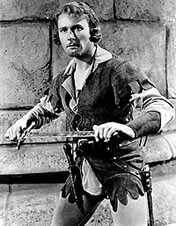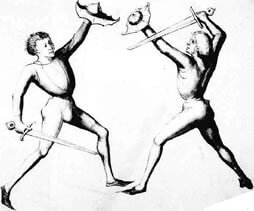swashbuckling soldier
Sorkin said in June 2012 that The Newsroom
is meant to be an idealistic, romantic, swashbuckling, sometimes comedic but very optimistic, upward-looking look at a group of people who are often looked at cynically. The same as with The West Wing, where ordinarily in popular culture our leaders are portrayed either as Machiavellian or dumb; I wanted to do something different and show a highly competent group of people.[26]
The Insidious Fine Print
Republicans have tried to insert scores of policy riders in the 2012 spending bill to pursue ideological goals.
Indeed, the role was very much a reflection of his own state of mind. He had more than once been heard to say how much he disliked acting, which he called “a self-conscious business.” He described himself as “a screaming schizoid,” an introvert disguised as an extrovert.
But he continued to act. In “Scaramouche” (1952), a swashbuckler set in 18th-century France, he fought a climactic duel with Stewart Granger.
http://biblehub.com/proverbs/2-7.htm
其他版本都翻譯成SHIELD
New American Standard Bible
He stores up sound wisdom for the upright; He is a shield to those who walk in integrity,
King James Bible
He layeth up sound wisdom for the righteous: he is a buckler to them that walk uprightly.
 buck・ler
buck・ler








━━ n. 丸盾; 防御物.
swashbuckler (swŏsh'bŭk'lər, swôsh'-) 
から威張りする軍人; 向こうみずな男.
swash・buckling a., n. から威張り(する).
swashbuckler
n.
derring-do
noun [U] OLD-FASHIONED OR HUMOROUS
brave action taken without considering the danger involved:
deeds/feats of derring-do
Heroic daring.
Origin
 We now use 'derring-do' as a rather curious and archaic sounding two-part noun to describe 'ye olde' swordplay and the like. Use of the phrase was almost obligatory in any review of films starring the late Errol Flynn, who was surely the most audacious actor ever to swash a buckle. The fact that we come to have the word at all is actually due to a series of mistakes by a group of very eminent writers.
We now use 'derring-do' as a rather curious and archaic sounding two-part noun to describe 'ye olde' swordplay and the like. Use of the phrase was almost obligatory in any review of films starring the late Errol Flynn, who was surely the most audacious actor ever to swash a buckle. The fact that we come to have the word at all is actually due to a series of mistakes by a group of very eminent writers.
The earliest form of 'derring-do' in print is found in Geoffrey Chaucer's Troylus And Criseyde, circa 1374:
In reading the above, the celebrated Tudor poet Edmund Spenser appears not to have realised that derrynge was a misprint of durring, the meaning of which he would have been familiar with, and interpreted 'derrynge do' as meaning 'brave actions'. That was the way he used it in several of his late 16th poems, including his best-known work, The Faerie Queene, 1596:
 Incidentally, Flynn and his flamboyant colleagues weren't described as swashbuckling for no reason. 'Swash' was a 16th century term that referred to the noise braggarts made to simulate the sound of swishing weapons when pretending to swordfight. A buckler was a small round shield, usually fixed to the forearm. So, a 'swashbuckler' was a swaggering ruffian; someone very likely to swash his buckle.
Incidentally, Flynn and his flamboyant colleagues weren't described as swashbuckling for no reason. 'Swash' was a 16th century term that referred to the noise braggarts made to simulate the sound of swishing weapons when pretending to swordfight. A buckler was a small round shield, usually fixed to the forearm. So, a 'swashbuckler' was a swaggering ruffian; someone very likely to swash his buckle.

- A flamboyant swordsman or adventurer.
- A sword-wielding ruffian or bully.
- A dramatic or literary work dealing with a swashbuckler.
[Probably from the striking of bucklers in fighting.]
から威張りする軍人; 向こうみずな男.
swash・buckling a., n. から威張り(する).
swashbuckler
n.
- A flamboyant swordsman or adventurer.
- A sword-wielding ruffian or bully.
- A dramatic or literary work dealing with a swashbuckler.
[Probably from the striking of bucklers in fighting.]
swash・buckler
derring-do
noun [U] OLD-FASHIONED OR HUMOROUS
brave action taken without considering the danger involved:
deeds/feats of derring-do
Derring-do
MeaningHeroic daring.
Origin
 We now use 'derring-do' as a rather curious and archaic sounding two-part noun to describe 'ye olde' swordplay and the like. Use of the phrase was almost obligatory in any review of films starring the late Errol Flynn, who was surely the most audacious actor ever to swash a buckle. The fact that we come to have the word at all is actually due to a series of mistakes by a group of very eminent writers.
We now use 'derring-do' as a rather curious and archaic sounding two-part noun to describe 'ye olde' swordplay and the like. Use of the phrase was almost obligatory in any review of films starring the late Errol Flynn, who was surely the most audacious actor ever to swash a buckle. The fact that we come to have the word at all is actually due to a series of mistakes by a group of very eminent writers.The earliest form of 'derring-do' in print is found in Geoffrey Chaucer's Troylus And Criseyde, circa 1374:
"In durring don that longeth to a knight."Chaucer was using the two words 'durring' and 'don' with their usual 14th century meanings of 'daring' and 'do'. This line in his work translates into 20th century language as 'in daring to do what is proper for a knight'. The poet John Lydgate, paraphrased Chaucer in The Chronicle of Troy, 1430, and his 'dorryng do' was misprinted in later versions of the work as 'derrynge do'.
In reading the above, the celebrated Tudor poet Edmund Spenser appears not to have realised that derrynge was a misprint of durring, the meaning of which he would have been familiar with, and interpreted 'derrynge do' as meaning 'brave actions'. That was the way he used it in several of his late 16th poems, including his best-known work, The Faerie Queene, 1596:
"A man of mickle name, Renowned much in armes and derring doe."Last, but not least, make way for that inveterate plunderer of historic language, Sir Walter Scott. His use of 'derring-do' as a single word in the hugely popular novel Ivanhoe, 1820, cemented it into the language:
"Singular," he again muttered to himself, "if there be two who can do a deed of such derring-do!"
 Incidentally, Flynn and his flamboyant colleagues weren't described as swashbuckling for no reason. 'Swash' was a 16th century term that referred to the noise braggarts made to simulate the sound of swishing weapons when pretending to swordfight. A buckler was a small round shield, usually fixed to the forearm. So, a 'swashbuckler' was a swaggering ruffian; someone very likely to swash his buckle.
Incidentally, Flynn and his flamboyant colleagues weren't described as swashbuckling for no reason. 'Swash' was a 16th century term that referred to the noise braggarts made to simulate the sound of swishing weapons when pretending to swordfight. A buckler was a small round shield, usually fixed to the forearm. So, a 'swashbuckler' was a swaggering ruffian; someone very likely to swash his buckle.The Phrase A Week newsletter goes out to 78,500 subscribers (60,500 by e-mail, 18,000 by RSS feed).
rider(rī'dər)
n.
- One that rides, especially one who rides horses.
- A clause, usually having little relevance to the main issue, that is added to a legislative bill.
- An amendment or addition to a document or record. Also called allonge.
- Something, such as the top rail of a fence, that rests on or is supported by something else.
roughrider
n.
- A skilled rider of little-trained horses, especially one who breaks horses for riding.
- Rough Rider A member of the First U.S. Volunteer Cavalry regiment under Theodore Roosevelt in the Spanish-American War.
Rough Riders, officially the First U.S. Cavalry Volunteers, fought in the Spanish-American War and became the most widely publicized regiment in American military history. Its members came from the cattle ranges, mining camps, and law enforcement agencies of the Southwest. Such personnel offered brilliant copy for war correspondents and the unit's inexperienced but colorful commanding officers, particularly Theodore Roosevelt, enhanced its swashbuckling image. Although only half the regiment actually fought the Spanish, the fragment that reached Cuba lived up to its advance publicity. From Las Guásimas to San Juan Hill, the Rough Riders' attacks were often unconventional, but usually successful and helped romanticize the war in the United States.
swashbuckling
adj. - 神氣活現的, 虛張聲勢的, 吹噓的
日本語 (Japanese)
n. - からいばり
adj. - からいばりする, がむしゃらな
insidious
Syllabification: (in·sid·i·ous)
Pronunciation: /inˈsidēəs/
Translate insidious | into German | into Italian | into Spanish adjective
Origin:
mid 16th century: from Latin insidiosus 'cunning', from insidiae 'an ambush or trick', from insidere 'lie in wait for', from in- 'on' + sedere 'sit'insidious
- 音節
- in • sid • i • ous
- 発音
- insídiəs
- レベル
- 社会人必須
[形]
[ラテン語insidiōsus(in-中に+sedēre座る=待ちぶせする→人をだます). △SIT, SEDENTARY]
in・sid・i・ous・ly
[副]
in・sid・i・ous・ness
[名]
沒有留言:
張貼留言